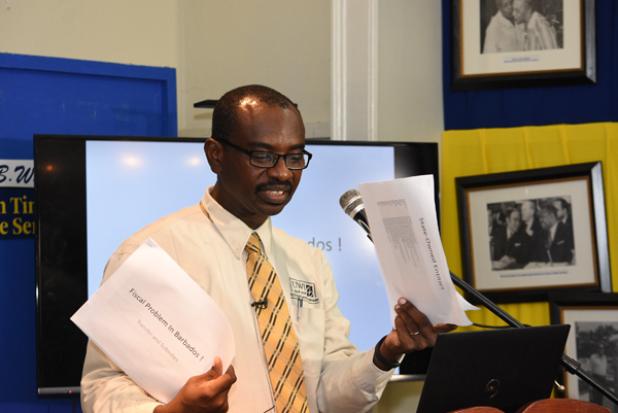
Dr. Justin Robinson, as he delivered the first Astor B. Watts Lunchtime Lecture for the year yesterday at the DLP Headquarters.
Report in Govt’s hands
Government is in possession of a report from the oversight committee set up to monitor state-owned enterprises and statutory bodies, outlining some recommendations on how best to manage those entities and the challenges posed by providing financing to them.
Word of this has come from Chairman of the State Owned Enterprises Oversight Committee, Dr. Justin Robinson. He made the disclosure yesterday afternoon during the first Astor B. Watts Lunchtime Lecture for the year, of which he was the featured speaker.
Robinson, while remaining mum on the details of that report, told those gathered in the Errol Barrow Gallery at the ruling Democratic Labour Party’s George Street headquarters, that it contains “a framework for adapting and some preliminary recommendations”.
This document, he revealed, the culmination of just over three years of work, was submitted to the relevant authorities approximately two months ago. The disclosure came as he explained that Transfers and Subsidies cover a number of areas including retirement benefits; subsidies such as the free bus fares for schoolchildren; grants to individuals including those on welfare; grants to non-profit organisations; and grants to public institutions of which there are 57 state-owned enterprises.
“If you are going to attack this you are really going to need some detailed analysis as to what you are going to do, so it is more a framework for adapting,” Robinson stated.
He added, “We have tried hard in a way not to give tight, specific recommendations; it is more to give a framework and a menu.”
Though not providing details on the contents of the report, in his presentation entitled “Fiscal Problems in Barbados: Transfers and Subsidies”, he outlined possible solutions to deal with the challenges facing Government as it relates to state-owned enterprises. The possible approaches include: to continue as is, which would require a revenue solution; abolish or wind-up entities which are no longer needed or have reached the end of their useful life; or merge entities that are performing similar function, thereby achieving economies of scale. He stated that private sector/commercial delivery is also an option, where the service is outsourced to the private sector to provide. In this respect, he explained that this can be achieved through an outright sale, a joint venture or management leases.
Robinson, who is also the Dean of the Faculty of Social Sciences, University of the West Indies (UWI), Cave Hill Campus and Chairman of the National Insurance Scheme Board, spoke to the growth seen in relation to the percentage of Government’s revenue that accounts for Transfers and Subsidies. He noted that in the 1996-1997 financial year it stood at 25 per cent, a decade later it moved to 39 per cent, and by the 2016-2017 financial year it moved to 41 per cent.
In respect of the latter, he said even though there are a lot of these entities, the money is really only spent on a few, among them the Queen Elizabeth Hospital, Transport Board, Sanitation Service Authority, the Barbados Tourism Marketing Inc., the Barbados Tourism Product Authority, the National Conservation Commission and the UWI. Moreover, he explained that three quarters of the transfers goes towards paying wages and salaries in these entities. As a result, he lamented there is no money left for capital expenditures and improving the organisations and so the entity remains dependent on Government.
“So if you are collecting this transfer and all of it is being spent on salaries, how do you fund the new buses? How do you buy more energy efficient buses? How do you buy more modern equipment?” he queried.
Robinson noted that these are the realities that have to be addressed. (JRT)
